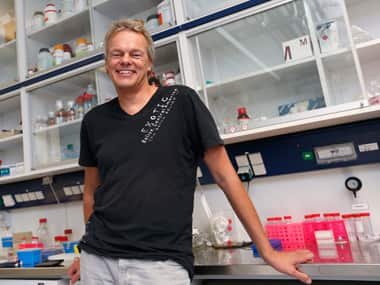London: The discovery of cells in the brain that act as the body’s internal global positioning system, which won three scientists the Nobel Prize for medicine on Monday, opens an intriguing new window onto dementia. Since these spatial cells are among the first to be hit in Alzheimer’s and other forms of dementia — explaining why sufferers often lose their way — understanding how they are degraded should shed important light on the disease process. That is the belief of British-American researcher John O’Keefe, winner of the 2014 prize alongside Norwegians May-Britt and Edvard Moser, who plans to take his research to the next level as director of a new brain institute in London. [caption id=“attachment_1745607” align=“alignleft” width=“380”]  Edvard Moser poses inside Max Planck Institute Martinsried of Biochemistry and Neurobiology in Munich. Reuters[/caption] “We’re now setting up to do much more high-tech studies where we hope to follow the progression of disease over time,” he told reporters after hearing he would share the 8 million Swedish crowns ($1.1 million) prize. “This will give us the first handle as to when and where the disease starts and how we can attack it at a the molecular and cellular level.” The battle against Alzheimer’s has been long and frustrating. Global cases of dementia are expected to treble by 2050, yet scientists are still struggling to understand its basic biology and drug development is littered with failures. The work by O’Keefe and the Mosers will not lead to immediate breakthroughs but by explaining how cells function – and then fail to function – in two very specific regions of the brain it is seen as vital for unpicking how Alzheimer’s develops. Dementia, of which Alzheimer’s is the most common form, already affects 44 million people worldwide and that number is set to reach 135 million by 2050, according to Alzheimer’s Disease International, a non-profit campaign group. “Understanding how the healthy brain functions, especially areas of the brain crucial to learning and memory, is incredibly important in understanding what changes occur during conditions such as Alzheimer’s disease,” said Doug Brown, director of research and development at Britain’s Alzheimer’s Society. The Nobel Prize winners’ work on the brain’s navigation system stretches back more than 40 years, but more recently scientists have developed powerful new tools for studying brain circuits that O’Keefe plans to put to work at the new London research institute where his is director. The first of more than 150 scientists will start work at the Sainsbury Wellcome Centre for Neural Circuits and Behaviour at University College London next year, using state-of-the-art lasers, molecular biology and computational modelling to explore the brain’s intricate wiring. “It’s a very exciting time,” O’Keefe said. The Group of Eight leading industrial countries set a goal last December of finding a cure or effective treatment for dementia by 2025. It is a decade since the last drug was approved to treat Alzheimer’s, and there is still no treatment that can slow the progression of the disease, with current drugs only easing some of the symptoms of the disorder. “We all know there is a time bomb there,” O’Keefe said. “We are starting to get a handle on it but that doesn’t mean it is going to turn into a cure in the immediate future.” REUTERS
Discovery of cells in brain that act as body’s internal global positioning system, which won 3 scientists the Nobel Prize, opens a new window onto dementia.
Advertisement
End of Article
Written by FP Archives
see more


)
)
)
)
)
)
)
)
)



